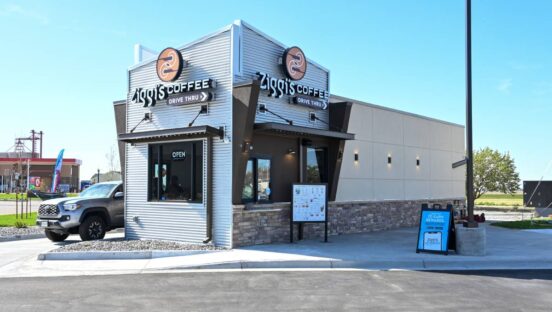Last year was a reset for Farmer Boys, says John Lucas, vice president of franchise development. The roughly 100-unit chain needed a recharge.
During the middle of COVID, the company didn’t find it appropriate to look at expansion. Instead, Farmer Boys completed a fair amount of portfolio optimization.
The fast casual gathered learnings throughout the pandemic and took time to focus on people development, with a specific emphasis on customer service.
In the meantime, Farmer Boys did manage to open a couple of stores in Nevada and Arizona. The chain is hoping these debuts will serve as a springboard for greater expansion outside the West Coast, including Utah, Colorado, and Oregon. The company wants to open 50 restaurants in the next five years.
“Because of the uniqueness of the brand, we think it’s going to fit in a lot of different markets,” says Lucas, explaining Farmer Boys’ growth strategy. “But when we look at the market conditions and the demographics and we get more specific in looking into certain cities, I think we look at our current mix of stores and where they’ve been successful and see that there’s a lot of cities within those states that will be a good matchup for us as a brand. Everybody fights this fight, but supply chain as well. We need to make sure that where we go, that we’re going to be able to pair that up with our supply chain to make sure that we can get consistency for our products across all of our stores.”
Farmer Boys is based primarily in Southern California, in addition to two restaurants in Arizona and nine in Nevada. The chain, founded in 1981, was the dream of five brothers who grew up on Cyprus, an island in the eastern Mediterranean Sea. Franchising began in 1995 when there were eight locations; now there are approximately 70 franchises operated by 31 franchisees.
Lucas describes the brand as a mixture between Denny’s and The Habit Burger Grill, two other legacy chains founded in Southern California.
“We’re kind of old school in some ways,” Lucas says. “And I think a lot of that kind of goes back to it truly is run by a family that truly feels like family. And in all aspects, whether it’s folks like me that are team members or its franchisees, we develop really strong long-term relationships. … We’re serving freshly made farm-fresh food in a drive-thru environment in under seven minutes. There’s not a lot of folks that can say that. And the food quality and the service levels I think are unique in the industry. And so I think we have exciting days in front of us.”
Farmer Boys prefers location-based, contiguous franchise growth, Lucas says. The brand doesn’t want to chase franchise opportunities across the country and spread itself thin. The company is opting to boost infrastructure and scale in certain markets before moving to new ones. In Utah, Colorado, and Oregon, the chain is seeking multi-unit franchisees that are familiar with building a concept and have been in the business for more than 10 years.
The current store prototype is around 2,800 square feet, but the chain is looking to shrink that even further to 2,500 square feet. The dining room would be downsized and more focus would be put into the drive-thru, which became a significant revenue driver during COVID. Farmer Boys is also making the experience for to-go customers and delivery drivers as seamless as possible, which means built-in shelving near the front door. The brand searches for rooftops in dense residential areas and places with light industry. Lucas says customers working in a trade job are the “bread and butter” during the week. On weekends, Farmer Boys shifts toward a family restaurant with many coming for breakfast.
In light of a shaky macroeconomic environment, Lucas says the brand has proven to be recession-proof in the past. There’s a level of optimism from a supply chain standpoint; the chain has seen mitigated price increases over the past 18 months. The part that worries franchisees more is the regulatory environment, particularly in California.
Looming largest is the FAST Act, a law allowing a 10-person council to regulate fast-food wages. The council would consist of two fast-food franchisors, two franchisees, two employees, two advocates of workers’ rights, one representative from the Department of Industrial Relations, and one from the Governor’s Office of Business and Economic Development. The group would have the power to raise the minimum wage up to $22 per hour and increase it by up to 3.5 percent every year thereafter.
The law received pushback from fast-food operators across the state. The Save Local Restaurants Coalition—formed by the U.S. Chamber of Commerce, the National Restaurant Association, and the International Franchise Association—gathered enough signatures to put the law to a referendum on the 2024 ballot. The law, if enacted, would apply to restaurants with 100 or more locations nationwide.
However, it’s a future issue that Farmer Boys can’t tackle until the time comes. Right now, matters are looking upward.
“Overall, we’re actually feeling pretty bullish about the coming year and beyond because the brand just performed well during prior recessions,” Lucas says.
A majority of growth will come from existing operators that have been selectively chosen over the years. Lucas says Farmer Boys wants “smart growth” that’s paced, meaning stores that don’t fail and franchisees that don’t experience economic trouble because of non-performance or real estate choices. The ideal candidate is a franchisee that signs on for the next 20 years and establishes a legacy that they can pass on.
“We’re not looking to explode five years across the country,” Lucas says. “That’s not who the brand is. It’s really methodical, well-thought-out growth, accelerating from where we’ve been in the past. But we want to focus on making sure whoever we bring on board is going to be successful with the brand and be a good partner in the long term for us.”









